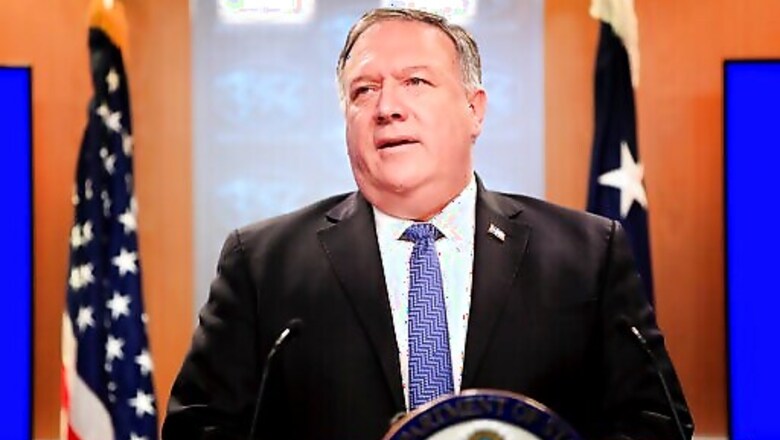
views
WASHINGTON The Trump administration will press ahead with efforts to extend a United Nations arms embargo on Iran despite widespread opposition to such a move at the world body, Secretary of State Mike Pompeo said Wednesday. The decision sets the stage for a potential crisis at the U.N. Security Council amid rising tensions in Middle East.
Pompeo said the United States would call for a Security Council vote next week on a U.S.-drafted resolution to extend the embargo that is due to expire in October. The resolution is widely expected to fail, as the other members of the Security Council have signaled their opposition.
The Security Councils mission is to maintain international peace and security,” Pompeo told reporters. “The council would make an absolute mockery of that mission if it were to allow the worlds leading state sponsor of terrorism to buy and sell weapons openly.
If the vote fails, Pompeo suggested the U.S. would invoke the so-called snapback mechanism that would restore all U.N. sanctions on Iran. Snapback was envisioned in the 2015 nuclear deal in the event Iran was proven to be in violation of the accord, under which it received billions of dollars in sanctions relief in exchange for curbs on its nuclear program.
One way or another we will ensure that the arms embargo will be extended, he said. “Were not going to let the arms embargo expire on October 18. Were deeply aware that snapback is an option that is available to the United States.
Trump pulled out of the nuclear deal in 2018 and has steadily reimposed U.S. penalties on Iran, leading Iran to step up uranium enrichment and heavy water production outside the allowed limits. Disputes over those violations remain unresolved.
The remaining participants in the 2015 nuclear deal have said the U.S. no longer has standing to invoke snapback. Administration officials and Iran hawks argue that as a permanent member of the Security Council, the U.S. remains party to the separate U.N. resolution that endorsed the deal and still has the legal grounds to call for the reimposition of sanctions.
Under the nuclear deal, the U.N. arms embargo against Iran will expire Oct. 18 if Iran is in compliance with the agreement. For several months, Pompeo and other U.S. officials have been lobbying for the indefinite extension of the embargo, saying its expiration would allow Iran to import weapons at will and further destabilize the Middle East.
The European participants in the nuclear deal, Britain, France and Germany, have said they have concerns about Iran’s ability to import and export weapons but have also pointed out that it was envisioned by the agreement. China and Russia have threatened to veto any attempt to extend the embargo.
But a snapback of U.N. sanctions would not be subject to veto, due to the unusual way the provision was worded. The other members of the Security Council could, however, simply choose to ignore a U.S. invocation of snapback, which would create a crisis of credibility in the U.N.’s most powerful body.
Disclaimer: This post has been auto-published from an agency feed without any modifications to the text and has not been reviewed by an editor
















Comments
0 comment